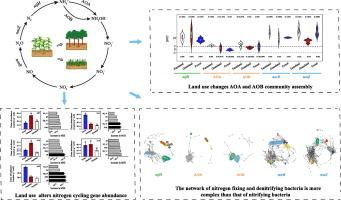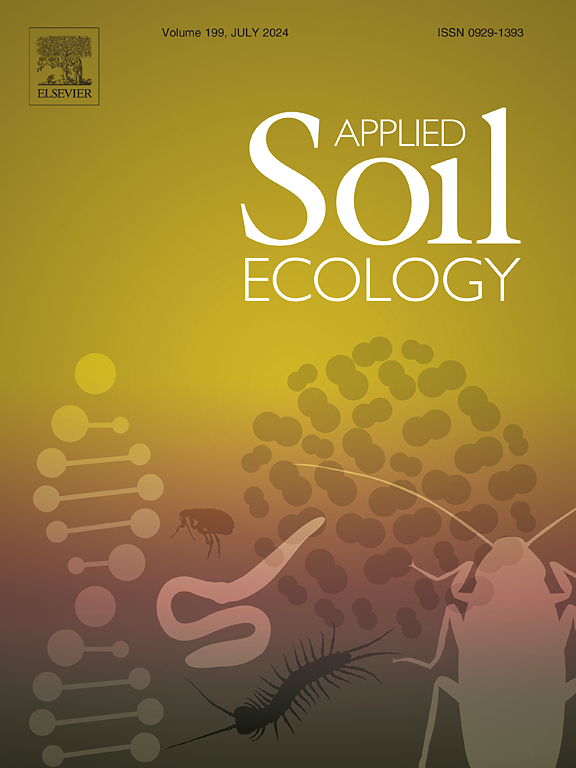退耕还林还草促进中国东北地区土壤质量恢复来自土壤氮循环的证据
IF 5
2区 农林科学
Q1 SOIL SCIENCE
引用次数: 0
摘要
土壤中含有多种参与氮循环(氮循环)的微生物群落,它们对保持土壤质量和健康至关重要。然而,农业集约化导致了土地用途的转变,对生态系统产生了负面影响。在生态恢复的背景下,缺乏对土地利用变化中整个氮循环过程的研究。在此,我们利用 qPCR(定量实时 PCR)和 MiSeq 技术分析了与固氮(nifH)、硝化(AOA 和 AOB)和反硝化(norB 和 nosZ)相关的功能基因,以探讨农田向森林和草地的转化是否会影响参与氮循环的微生物群落的变化。我们通过土壤特性揭示了生态恢复对氮循环中微生物群落功能的潜在影响。具体来说,土地用途转换增加了氮循环基因的丰度,并改变了氮循环微生物群落的表现。生态恢复增加了随机过程在 AOA 和 AOB 群落组装中的重要性,并影响了土壤氮循环微生物网络的生态群落。总之,这些发现揭示了影响土壤氮循环的特定微生物过程和相互作用,并为今后研究支持土壤健康的可持续土地管理方法提供了启示。本文章由计算机程序翻译,如有差异,请以英文原文为准。

Returning farmland to forests and grasslands promotes soil quality restoration in Northeast China: Evidence from soil nitrogen cycle
Soils contain a diversity of microbial communities involved in the nitrogen cycle (N-cycling), which are essential for maintaining the quality and health of soil. However, agricultural intensification has led to land use conversion, which has had a negative impact on ecosystems. There is a lack of research on the whole N-cycling process in land use change under the context of ecological restoration. Here, we utilized qPCR (Quantitative Real-time PCR) and MiSeq techniques to analyse the functional genes related to nitrogen fixation (nifH), nitrification (AOA and AOB) and denitrification (norB and nosZ) to explore whether the conversion of farmland to forest and grassland affects changes in microbial communities involved in the N-cycling. We reveal the potential effects of ecological restoration on microbial community function in the N-cycling through soil properties. Specifically, land use conversion increased N-cycling gene abundance and changed in the N-cycling microbiome exhibited. The ecological restoration has increased the importance of stochastic processes in the assembly of AOA and AOB communities and affected the ecological cluster of soil N-cycling microbial network. Overall, these findings reveal specific microbial processes and interactions that influence the soil N-cycling and provide insights for future research on sustainable land management approaches that support soil health.
求助全文
通过发布文献求助,成功后即可免费获取论文全文。
去求助
来源期刊

Applied Soil Ecology
农林科学-土壤科学
CiteScore
9.70
自引率
4.20%
发文量
363
审稿时长
5.3 months
期刊介绍:
Applied Soil Ecology addresses the role of soil organisms and their interactions in relation to: sustainability and productivity, nutrient cycling and other soil processes, the maintenance of soil functions, the impact of human activities on soil ecosystems and bio(techno)logical control of soil-inhabiting pests, diseases and weeds.
 求助内容:
求助内容: 应助结果提醒方式:
应助结果提醒方式:


